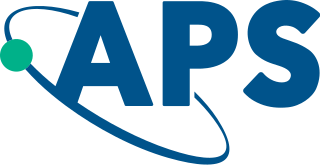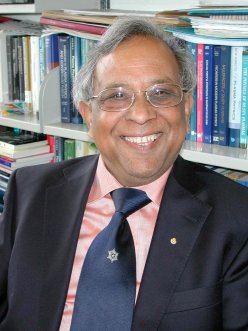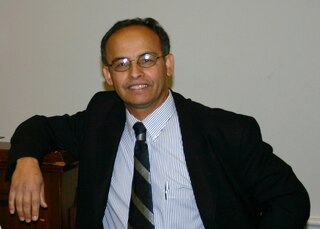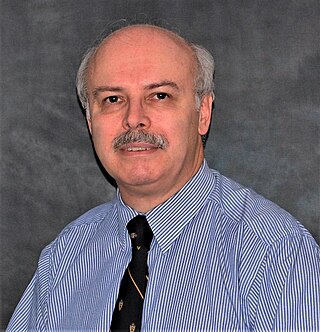Related Research Articles

The American Physical Society (APS) is a not-for-profit membership organization of professionals in physics and related disciplines, comprising nearly fifty divisions, sections, and other units. Its mission is the advancement and diffusion of knowledge of physics. It publishes more than a dozen scientific journals, including the prestigious Physical Review and Physical Review Letters, and organizes more than twenty science meetings each year. It is a member society of the American Institute of Physics. Since January 2021, it is led by chief executive officer Jonathan Bagger.

Virginia Louise Trimble is an American astronomer specializing in the structure and evolution of stars and galaxies, and the history of astronomy. She has published more than 600 works in Astrophysics, and dozens of other works in the history of other sciences. She is famous for an annual review of astronomy and astrophysics research that was published in the Publications of the Astronomical Society of the Pacific, and often gives summary reviews at astrophysical conferences. In 2018, she was elected a Patron of the American Astronomical Society, for her many years of intellectual, organizational, and financial contributions to the society.
Controlled vocabularies provide a way to organize knowledge for subsequent retrieval. They are used in subject indexing schemes, subject headings, thesauri, taxonomies and other knowledge organization systems. Controlled vocabulary schemes mandate the use of predefined, preferred terms that have been preselected by the designers of the schemes, in contrast to natural language vocabularies, which have no such restriction.

The American Institute of Physics (AIP) promotes science and the profession of physics, publishes physics journals, and produces publications for scientific and engineering societies. The AIP is made up of various member societies. Its corporate headquarters are at the American Center for Physics in College Park, Maryland, but the institute also has offices in Melville, New York, and Beijing.
The Mathematics Subject Classification (MSC) is an alphanumerical classification scheme that has collaboratively been produced by staff of, and based on the coverage of, the two major mathematical reviewing databases, Mathematical Reviews and Zentralblatt MATH. The MSC is used by many mathematics journals, which ask authors of research papers and expository articles to list subject codes from the Mathematics Subject Classification in their papers. The current version is MSC2020.

Applied Physics Letters is a weekly peer-reviewed scientific journal that is published by the American Institute of Physics. Its focus is rapid publication and dissemination of new experimental and theoretical papers regarding applications of physics in all disciplines of science, engineering, and modern technology. Additionally, there is an emphasis on fundamental and new developments which lay the groundwork for fields that are rapidly evolving.
Simple Knowledge Organization System (SKOS) is a W3C recommendation designed for representation of thesauri, classification schemes, taxonomies, subject-heading systems, or any other type of structured controlled vocabulary. SKOS is part of the Semantic Web family of standards built upon RDF and RDFS, and its main objective is to enable easy publication and use of such vocabularies as linked data.
The Journal of Physics A: Mathematical and Theoretical is a peer-reviewed scientific journal published by IOP Publishing, the publishing branch of the Institute of Physics. It is part of the Journal of Physics series and covers theoretical physics focusing on sophisticated mathematical and computational techniques.
Inspec is a major indexing database of scientific and technical literature, published by the Institution of Engineering and Technology (IET), and formerly by the Institution of Electrical Engineers (IEE), one of the IET's forerunners.

Jonathan P. Dowling was an Irish-American researcher and professor in theoretical physics, known for his work on quantum technology, particularly for exploiting quantum entanglement for applications to quantum metrology, quantum sensing, and quantum imaging.
SPINbibliographic database is an indexing and abstracting service produced by the American Institute of Physics (AIP). The content focus of SPIN is described as the most significant areas of physics research. This type of literature coverage spans the major physical science journals and magazines. Major conference proceedings that are reported by the American Institute of Physics, member societies, as well as affiliated organizations are also included as part of this database. References, or citations, provide access to more than 1.5 million articles as of 2010. SPIN has no print counterpart.

Padma Kant Shukla was a distinguished Professor and first International Chair of the Physics and Astronomy Department of Ruhr-University Bochum in Germany. He was also the director of the International Centre for Advanced Studies in Physical Sciences at Ruhr-University Bochum. He held a PhD in physics from Banaras Hindu University in Varanasi, India and a second doctorate in Theoretical Plasma Physics from Umeå University in Sweden.

Mounir Laroussi is a Tunisian-American scientist. He is known for his work in plasma science, especially low temperature plasmas and their biomedical applications.

Ivan Aničin, was Yugoslav and Serbian nuclear physicist, particle physicist, astrophysicist, and cosmologist, university Full Professor and Distinguished (teaching/research) Professor of scientific institutes in Belgrade (Serbia), Bristol, Grenoble (France), and Munich (Germany).
In the context of information retrieval, a thesaurus is a form of controlled vocabulary that seeks to dictate semantic manifestations of metadata in the indexing of content objects. A thesaurus serves to minimise semantic ambiguity by ensuring uniformity and consistency in the storage and retrieval of the manifestations of content objects. ANSI/NISO Z39.19-2005 defines a content object as "any item that is to be described for inclusion in an information retrieval system, website, or other source of information". The thesaurus aids the assignment of preferred terms to convey semantic metadata associated with the content object.

Andreas Mandelis FRSC, FCAE, FAPS, FSPIE, FAAAS, FASME, is a Greek - Canadian physicist who is a professor and researcher in the department of Mechanical and Industrial Engineering at the University of Toronto. He is the director of the Center for Advanced Diffusion-Wave and Photoacoustic Technologies (CADIPT). and of the Institute for Advanced Non-Destructive and Non-Invasive Diagnostic Technologies (IANDIT) at the University of Toronto. He is an internationally recognized expert in thermophotonics. and is considered a pioneer in the fields of diffusion-wave, photothermal, and photoacoustic sciences and related technologies. His research interests encompass studies of physical energy conversion processes in condensed and biological matter as they impact instrumentation science and signal generation technologies with applications spanning the development of a wide spectrum of novel instrumentation, measurement and imaging techniques using optical-to-thermal, thermoelastic, electronic, ultrasonic and/or photonic energy conversion high-dynamic-range and high-sensitivity analytical methodologies, leading to advanced non-destructive / non-invasive diagnostic, inspection and monitoring technologies with major focus on advanced dynamic imaging instrumentation for industrial and biomedical applications. He is the inventor of a photothermal imaging radar which can detect tooth decay at an early stage, can detect the onset of cancerous lesions in soft tissues, cracks in teeth and monitor dental structural integrity over time. His research team also pioneered and patented 22 analytical instrumentation and measurement methodologies and metrologies.
Physics outreach encompasses facets of science outreach and physics education, and a variety of activities by schools, research institutes, universities, clubs and institutions such as science museums aimed at broadening the audience for and awareness and understanding of physics. While the general public may sometimes be the focus of such activities, physics outreach often centers on developing and providing resources and making presentations to students, educators in other disciplines, and in some cases researchers within different areas of physics.
David Joseph Singh is a theoretical physicist who is a curators' professor in the Department of Physics and Astronomy at the University of Missouri in Columbia, Missouri. He was previously a corporate fellow at the Oak Ridge National Laboratory (ORNL).
PhySH, an abbreviation for Physics Subject Headings, is a classification scheme developed by the American Physical Society (APS) as a universal classification scheme covering all branches of physics including astronomy, quantum computation, and physics education. This scheme was unveiled in January 2016. It substitutes the previous Physics and Astronomy Classification Scheme (PACS) of the American Institute of Physics (AIP) and is currently the working tool for all journals of APS and all scientific Conferences and Meetings called by APS.
The Computer Science Ontology (CSO) is an automatically generated taxonomy of research topics in the field of Computer Science. It was produced by the Open University in collaboration with Springer Nature by running an information extraction system over a large corpus of scientific articles. Several branches were manually improved by domain experts. The current version includes about 14K research topics and 160K semantic relationships.
References
- 1 2 3 "PACS home page". AIP Website. AIP. Archived from the original on 14 October 2008. Retrieved 10 April 2013.
- ↑ "What is PACS?". AIP Website. AIP. Archived from the original on 22 November 2013. Retrieved 10 April 2013.
- ↑ PACS cloud. Reports on Progress in Physics. 2013. (scroll to the bottom of the page)
- ↑ "Access Innovations, Inc. and American Institute of Physics "Unravel" New Thesaurus for Online Scholarly Publications". Access Innovations Website. Access Innovations. Archived from the original on 22 September 2018. Retrieved 10 April 2013.